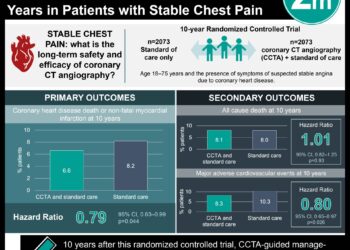Long-term enzyme-inducing antiseizure medication use associated with elevated hazard of incident cardiovascular disease
1. In this cohort study, there was a dose-dependent association between enzyme-inducing antiseizure medication use and an elevated hazard of incident cardiovascular disease.
2. Short-term enzyme-inducing antiseizure medication therapy did not confer considerable risk, but caution should be used when taking these medications long-term, particularly in patients with late-onset epilepsy.
Evidence Rating Level: 2 (Good)
Study Rundown: Cardiovascular risk factors, such as hypertension, dyslipidemia, type 2 diabetes, and atrial fibrillation, are known to be more prevalent in individuals with adult-onset epilepsy, likely associated with epilepsy itself as well as sedentary behaviors, high rates of cigarette smoking, and lower socioeconomic status. Enzyme-inducing antiseizure medications (eiASMs) used for the treatment of epilepsy have also been hypothesized to contribute to long-term risks of cardiovascular disease. This cohort study sought to 1) compare the risk associated with eiASMs vs non-eiASMs, 2) evaluate the risks of eiASMS in incident cases of epilepsy, and 3) assess the risk of eiASM in patients with late-onset epilepsy diagnosed after 65 years who may be at greatest risk of the adverse effects of long-term eiASM therapy. The main endpoint was incident cardiovascular disease (ischemic heart disease or ischemic/hemorrhagic stroke). Among 31,479 patients, the hazard of incident cardiovascular disease was higher for those receiving 4 consecutive prescriptions for eiASMs compared with non-eiASMs. In addition, persistent use of eiASMs in patients showed that a higher defined daily dose was associated with an increase in incident cardiovascular disease compared with no eiASM throughout a maximum of 25 years follow-up. These findings demonstrated a dose-dependent association between eiASM use and an elevated hazard of incident cardiovascular disease. Short-term eiASM therapy did not confer considerable risk, but caution should be used when taking these medications long-term, particularly in patients with late-onset epilepsy. A limitation of this study was that the analyses of may have been subject to immortal time bias, where some patients may have developed and died of cardiovascular disease prior to epilepsy onset, resulting in a cohort that is misleadingly more resistant to cardiovascular disease due to survival advantage.
Click to read the study in JAMA Neurology
Relevant Reading: Increased risk of stroke and myocardial infarction in patients with epilepsy: A systematic review of population-based cohort studies
In-Depth [prospective cohort]: This cohort study included 50,888 adult patients with epilepsy (median [IQR] age, 32 [19-50] years; 16,584 [53%] female), of whom 31,479 (62%) were diagnosed between January 1990 to March 2019 and free of cardiovascular disease at baseline. Eligible patients 18 years or older from primary care and National Health Service centers in England received 4 consecutive eiASMs (carbamazepine, eslicarbazepine, oxcarbazepine, phenobarbital, phenytoin, primidone, rufinamide, or topiramate) following a diagnosis of adult-onset epilepsy or repeated exposure in a weighted cumulative exposure model. For those receiving eiASMs, the hazard ratio for incident cardiovascular disease was 1.21 (95%CI, 1.06-1.39) using an adjusted propensity-matched survival analysis and weighted cumulative exposure model. In individuals with persistent exposure to eiASMs beyond 4 prescriptions, the hazard was associated with an increased risk of cardiovascular disease for those with a higher defined daily dose compared to no eiASMs throughout a maximum of 25 years follow-up (median HR [IQR], daily dose of 1: 1.54 [1.28-1.79]; daily dose of 2: 2.38 [1.52-3.56]). Lastly, the hazard was elevated but attenuated when restricting for incident cases or individuals with late-onset epilepsy diagnosed after 65 years.
Image: PD
©2021 2 Minute Medicine, Inc. All rights reserved. No works may be reproduced without expressed written consent from 2 Minute Medicine, Inc. Inquire about licensing here. No article should be construed as medical advice and is not intended as such by the authors or by 2 Minute Medicine, Inc.







